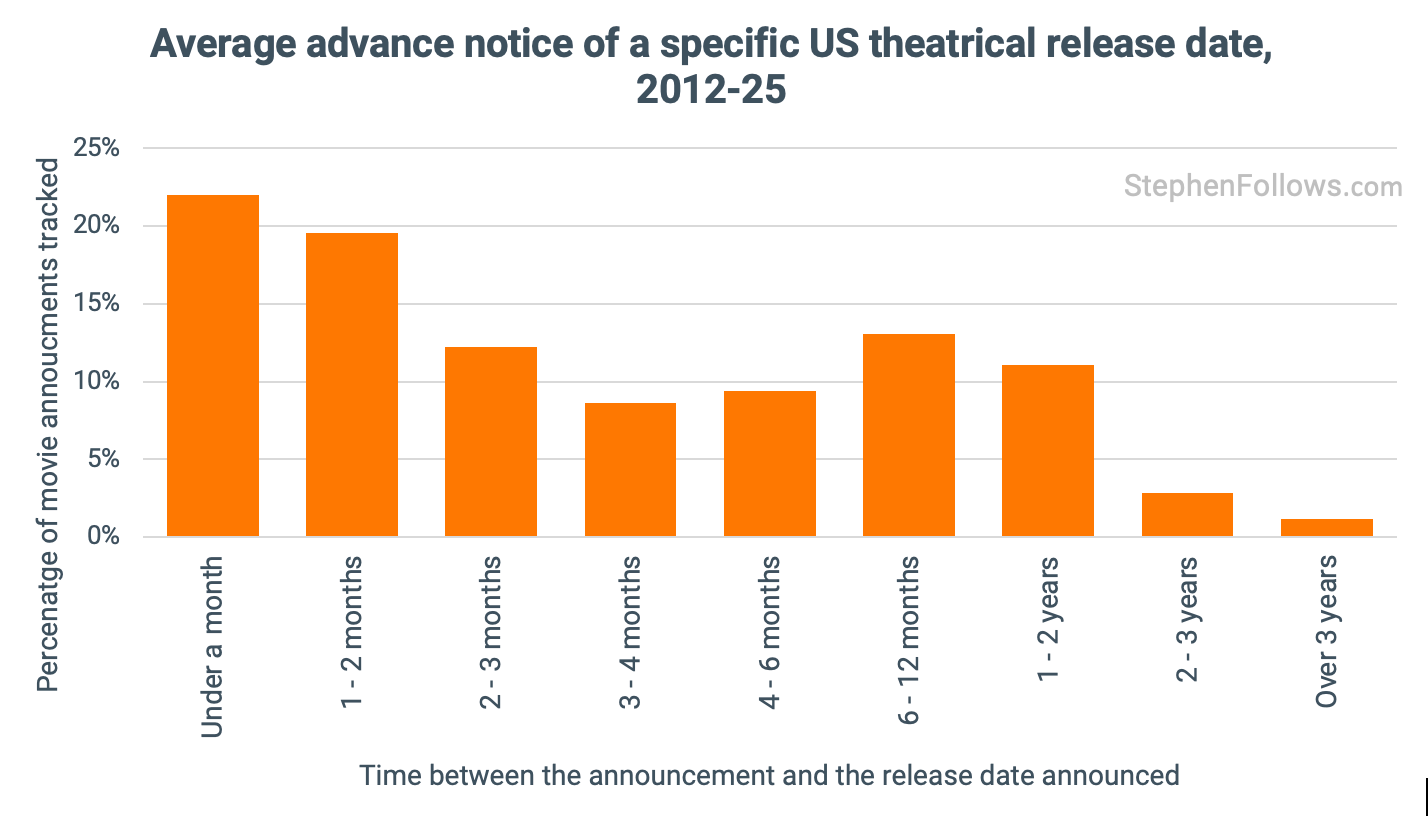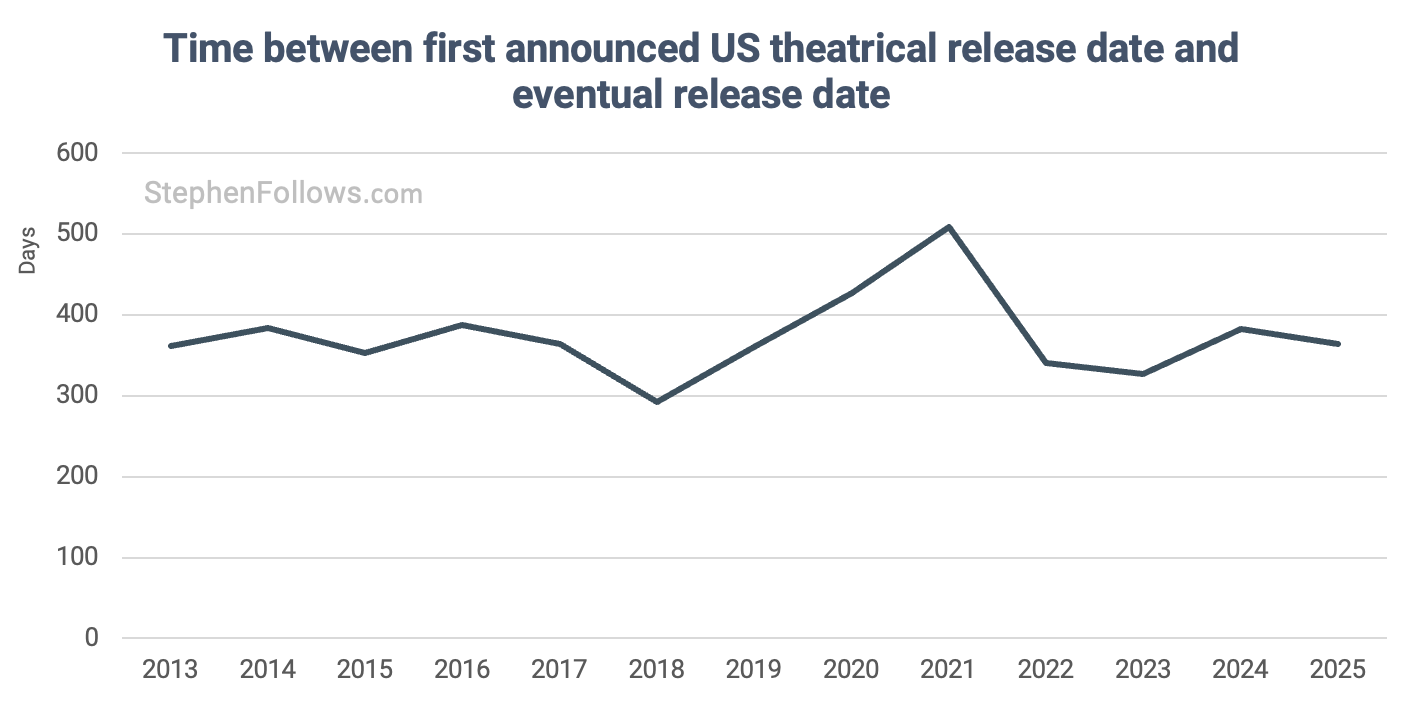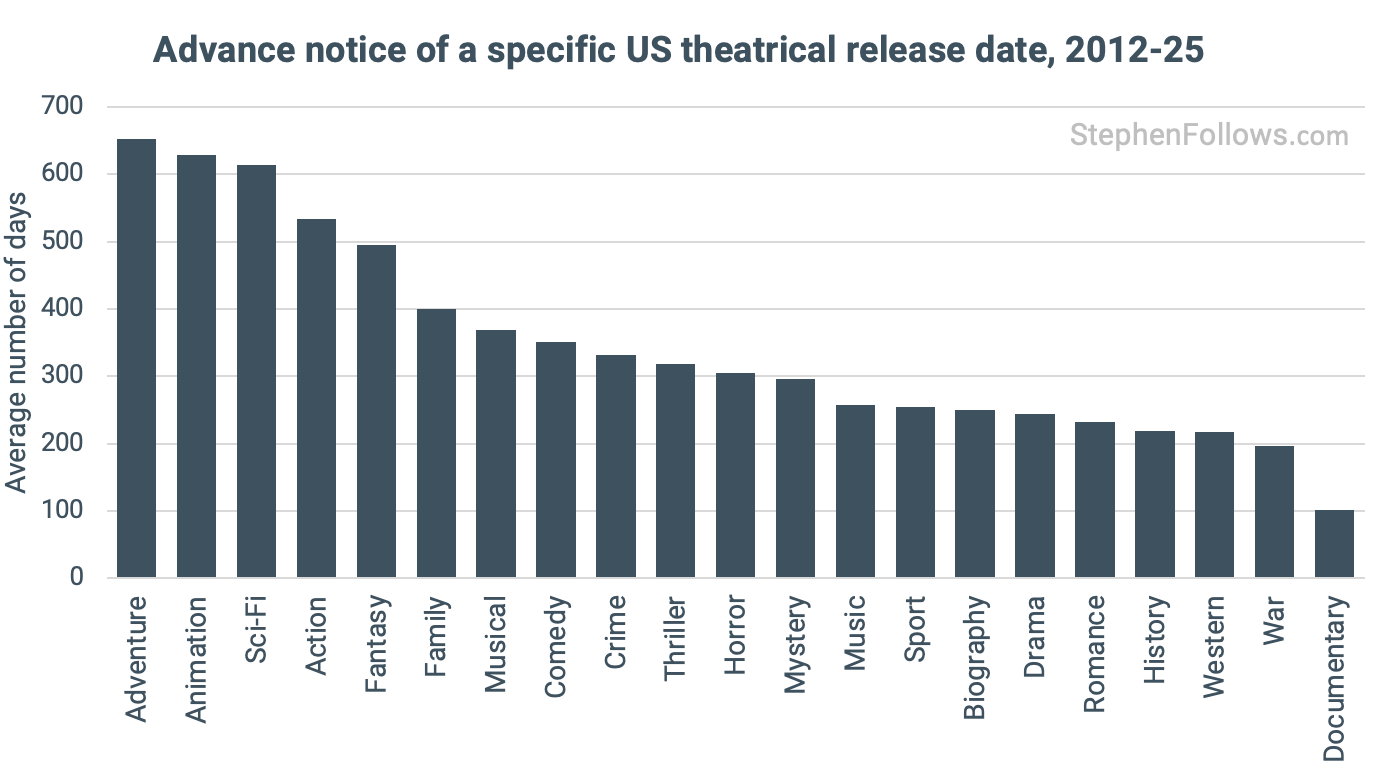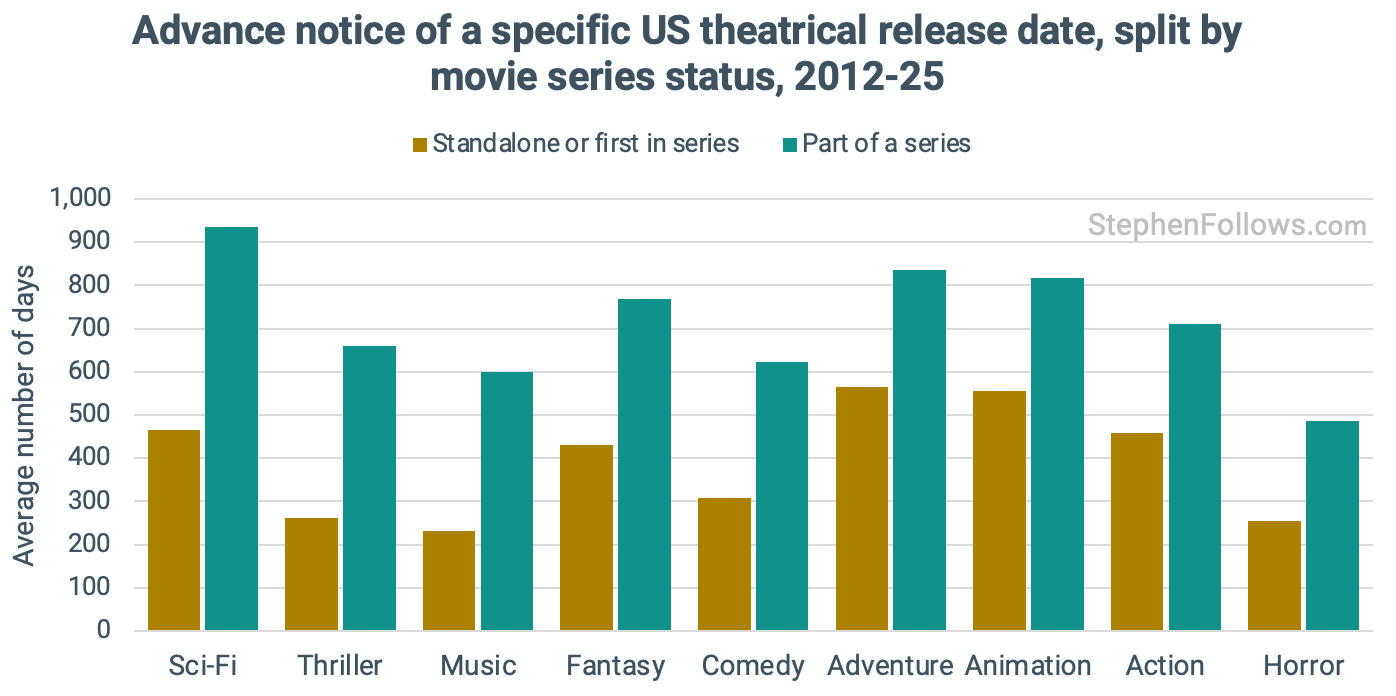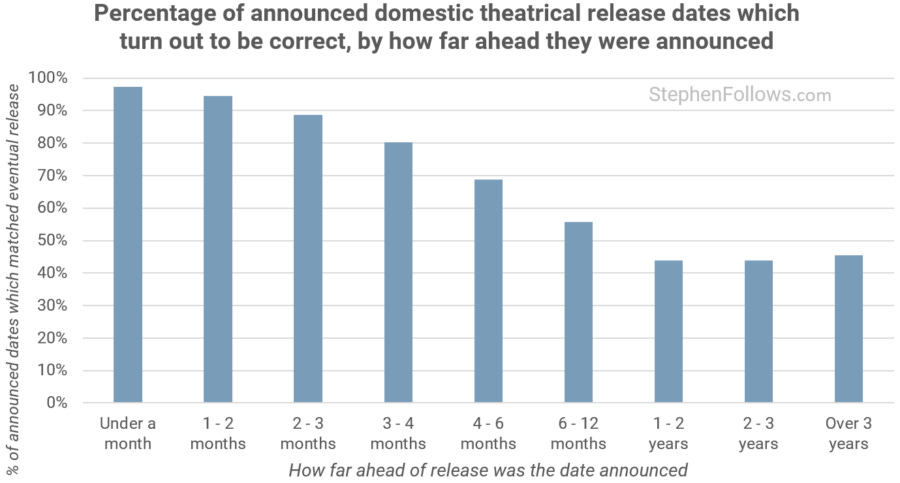How far in advance are movie release dates announced?
Crunching the data on 11,560 movie release date announcements to see what’s normal.
The official release date of Avatar 5 is currently 19th December 2031.
That specific date was announced in June 2023, a whopping 3,109 days in advance of release.
The fact that Avatar 5 was going to be made was announced in December 2009, just a week ahead of the first Avatar hitting the big screen - over 8,000 days before the current expected release.
Announcing movie release dates is nothing new but this feels like a more extreme case. But is it?
I built a database of 11,560 announcements for the US theatrical release dates for movies over the past 15 years to learn more.
What are they announcing?
Let's start by understanding what a release date announcement can look like. My full dataset includes three types:
Just year. This is the vaguest of announcements, often reported by trade papers based on a comment or remark made during an interview with someone close to the production.
Month and year. Other announcements come with an estimated month as well as a year. In reality, this isn't giving a whole lot more information away, as movies are typically released in fairly well-defined slots within the year. (More on release patterns here and here).
Exact date. This is the studio or distributor announcing the specific date their movie will open domestically.
Nearly four out of five release date announcements are in the form of an exact date.
For the rest of this article, I'm going to focus on the 79% of announcements which specify a particular day in the calendar.
How far in advance are release dates announced?
Almost a quarter of films announce their exact US release date to the public less than a month before opening. These tend to be smaller releases or titles with limited marketing spends, where there is little benefit to a long build-up. For these films, most ticket sales happen in the final few days anyway.
At the other end of the spectrum, 15.1% of release dates are announced more than a year ahead. 1.2% are announced more than three years in advance. These are nearly always studio event movies or franchise instalments. In between, the majority of dates are made public between one and twelve months ahead of release.
The effects of the pandemic on movie release dates
The Covid-19 pandemic hit the film industry hard, with cinemas closed, productions paused, and almost every big movie moved. Top Gun: Maverick was delayed six times, and No Time to Die shifted by 18 months.
We can see this is release data. In 2021, the average delay between first announced date and actual release jumped to over 500 days. Studios kept making new announcements, only to shift dates again as the pandemic dragged on.
But now that we’re a few years beyond the pandemic, the release data pattern has neatly returned to what it was during the 2010s.
How it differs by genre
So far, I have been treating all movies equally, however, there is a huge difference between a big budget studio tentpole and a small indie flick with a limited release. If we subdivide the advance notice data by genre, we can see some very clear patterns.
Adventure movies and Animations have the longest lead time - an average of 651 days and 638 days respectively. This is due to a mix of factors, include the size of the budgets requiring the claiming of a prime release spot and the long lead times to make such movies.
The genres with the shortest time between the announcement of a specific release date and said date were westers, war films and documentaries. These types of movies typically don't have big budgets, a large marketing spend or an existing support base, thereby reducing the utility of an early announcement.
Sequels are announced earlier
One other factor to bear in mind is how anticipated the new movie is. The easiest way of seeing this is with the announcement of release dates for sequels. Sequels are only created because the first movie was a financial success, meaning that it's fair to assume that sequels, on average, command more public interest than non-sequels.
This is reflected in how early release dates are announced. In all genres (which had enough sequels to made the results meaningful), they are announced earlier than non-sequels, on average. In the case of comedies, it's more than twice as early, with non-sequels being announced an average of 307 days before release whereas it's 622 days for sequels.
Are early dates often correct?
Given how far in advance some movies are confirming their exact release date, you may wonder how many of these dates turn out to be correct. If so, good news - I checked!
Unsurprisingly, the nearer the release date, the more accurate the information ends up being. Dates announced within a month are correct 97% of the time, compared with just 45% of the time with dates announced a year out.
Less intuitive is the flattening of the curve once we get past one year. This is a reflection of the fact that the vast majority of movies with such early announcements come from major studios. This is because:
Studios have the infrastructure to plan this far ahead;
They have the clout and money to scare off rivals who were previously eyeing up the same date; and
They actually have a very small number of possible dates to pick from. In the case of Avatar 5, they are claiming the pre-Christmas slot which big budget movie franchises covet (i.e. Lord of the Rings, The Hobbit, Star Wars, etc) and so there were only maybe one or two other dates within that year that they could have selected.
Are they over- or under-estimating dates?
Finally, when movie release dates change, which direction do they tend to move in - sooner, or later?
In three-quarters of cases, when revised release dates are announced they are later than the previous date.
Further reading
I have studied the topic of release dates a few times before, and so you may enjoy the following articles:
Notes
The data for today's piece came from IMDb, Movie Insider, Wikipedia and The Numbers / OpusData.
Avatar: Way of the WTF
I thought I’d spare you this list in the main article but it’s useful to have down here to illustrate how (and by how much) movie release dates change. Here are some of the public release dates each of the Avatar movies have had over the past 15 years:
Avatar 2
Oct 27, 2010 – December 2014
Late 2013 – December 2016
Jan 14, 2015 – December 2017
Apr 14, 2016 – Christmas 2018
Apr 22, 2017 – December 18, 2020
May 7, 2019 – December 17, 2021
Jul 23, 2020 – December 16, 2022
Released – December 16, 2022
Avatar 3
Late 2013 – December 2017
Jan 14, 2015 – 2018
Apr 14, 2016 – 2020
Apr 22, 2017 – December 17, 2021
May 7, 2019 – December 22, 2023
Jul 23, 2020 – December 20, 2024
Jun 13, 2023 – December 19, 2025
Avatar 4
Late 2013 – December 2018
Apr 14, 2016 – 2022
Apr 22, 2017 – December 20, 2024
May 7, 2019 – December 19, 2025
Jul 23, 2020 – December 18, 2026
Jun 13, 2023 – December 21, 2029
Avatar 5
Apr 14, 2016 – 2023
Apr 22, 2017 – December 19, 2025
May 7, 2019 – December 17, 2027
Jul 23, 2020 – December 22, 2028
Jun 13, 2023 – December 19, 2031




